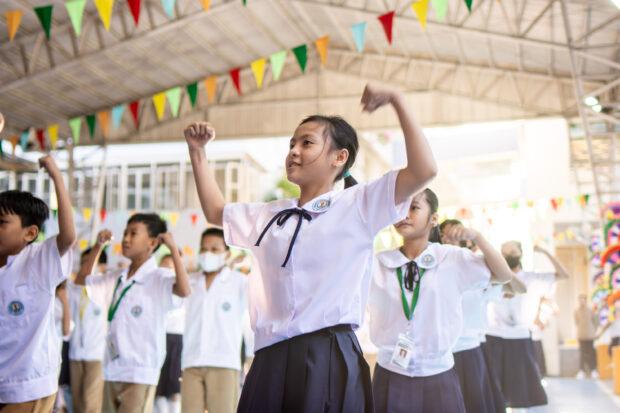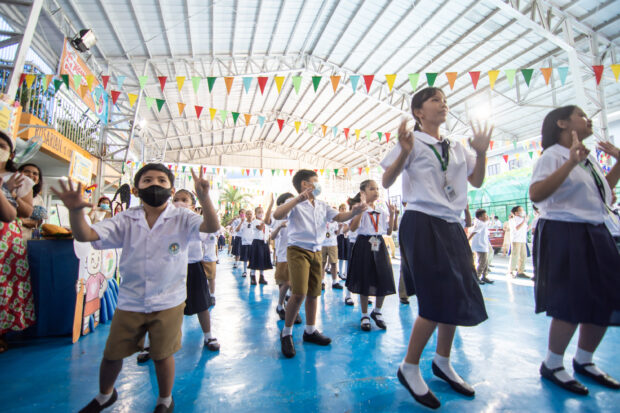Malnutrition remains a prevalent issue among Filipino children, with data from the Expanded National Nutrition Survey (ENNS) 2018-2019 conducted by the Department of Science and Technology – Food and Nutrition Research Institute (DOST-FNRI) showing that one in four (24.9%) school-aged children is stunted. Efforts to address this urgent issue are already under way after President Ferdinand Marcos Jr. said that the government will prioritize the problem of malnutrition in the country in the coming years, beginning with the implementation of the Philippine Multisectoral Nutrition Project (PMNP).

For its part, Nestlé Philippines has been unwavering in its commitment to address malnutrition in the last decade through its Nestlé Wellness Campus, an advocacy program that focuses on health and wellness education, in partnership with the Department of Education (DepEd).
What is the Nestlé Wellness Campus?
Starting in 2013, the Nestlé Wellness Campus seeks to help uplift the lives of Filipino children by playing an active role in their education on health and nutrition. The program began with only 250 high schools with a total of 650,000 students in the National Capital Region (NCR), with the goal of raising awareness on nutrition and physical activity. A dance program was held to promote an active lifestyle, and nutritionist-dietitians gave talks about balanced and healthy food choices to address the nutrition gaps and encourage healthier eating habits.
“As the Kasambuhay sa Kalusugan of Filipino families, Nestlé Philippines launched the Nestlé Wellness Campus program in 2013 to educate and encourage our students to develop healthy habits that would help them lead healthier and happier lives. We are grateful to the DepEd for being our partner in this advocacy, as we continue to promote proper nutrition and wellness practices through various materials and activities for the students, their parents and teachers,” Jose Uy III, Senior Vice President and Head of Corporate Affairs of Nestlé Philippines.
Since then, Nestle Wellness Campus has co-developed with experts a library of modules, teacher lesson guides, student worksheets, and other materials for grades 1 to 10. Learning about the seven Healthy Habits, namely: Choose Nutritious and Varied Options, Manage Portions, Drink Water and Milk, Play Actively, Enjoy Meals Together, Keep Good Hygiene and Care for the Planet has never been easier.

Two Facebook Communities, one for teachers and the other for parents, further serve as platforms to discuss nutrition-related topics via webinars, as well as to exchange best practices to inspire other members. Inter-school and inter-region contests are also held throughout the school year to provide a venue for the students and the school community to showcase their efforts in living out the seven Healthy Habits.
In its 10 years of implementation, the program has reached more than 10.5 million students and over 400,000 teachers in 21,253 public schools nationwide. From just NCR, the Nestle Wellness Campus is now being implemented in seven regions, including Region 4-A (Calabarzon), Region 5 (Bicol Region), Region 6 (Western Visayas), Region 7 (Central Visayas), Region 10 (Northern Mindanao), Region 11 (Davao Region) and NCR.
Stories from the communities
“Maraming bata ang mababa ang timbang,” Mrs. Florenda Aquino, Assistant Principal at Fourth Estate Elementary School in Parañaque, said of the almost 2,000 students enrolled in School Year 2019-2020. When the school implemented the Nestlé Wellness Campus, Aquino said the program helped improve the students’ overall health and nutrition. But more importantly, it became a lifestyle for the students, which they passed on to their families, as they lived out the healthy habits learned. “Ang mga bata na ang nagsasabi sa kanilang magulang na dapat may gulay silang kakainin,” she explained.
Another story, this time from Catanduanes, highlights the importance of clean water to the students’ overall health. For Efren Matienzo, Jr., principal at the Palumbanes Integrated School, this was evident among the students in the remote island community. When he was assigned to the school at the height of the pandemic in 2020, he found a TV documentary that labeled the island as “Islang Salat.”
“According to that documentary, malnutrition was prevalent in the island and one of its causes was the lack of clean water supply,” Matienzo explained. As such, Matienzo implemented the Nestlé Wellness Campus and emphasized the need to educate all students about the seven healthy habits. He then prioritized efforts to secure a water filtration system for the school and local community, which the Nestlé Wellness Campus recently turned over to their school.
“All our 550 students will now be able to drink clean water,” he said, adding that in addition to the students, more than 130 households will also directly benefit from the project once it’s operational. “As I would always tell our teachers, yung pagod natin, hindi nasayang. We must give them everything that we can because the students deserve it.”
Similarly, the teachers of Marigondon National High School (MNHS) in Lapu-Lapu City in Cebu observed that most of their students lacked energy during their first class of the day. Curious, the teachers surveyed their students and found that Grades 7 to 10 students were particularly underweight and were not eating a balanced diet. Meanwhile, for Grades 8 and 9 students, they noted the students’ irregular sleeping pattern.
“Late sila natutulog at late gumigising,” Ms. Rose Ann Cañete, a Nestlé Wellness Campus coordinator, said. With a population of 6,000 students in 2019, MNHS was classified as a megaschool that needed to schedule shifting to accommodate all grade levels.
With different class schedules, not all students experienced a flag raising ceremony. To address these various concerns, Cañete and fellow coordinator Arnel Arong, said that their implementation of “Wellness Day” got the students all excited and pumped to dance with their friends, as a class and even with teachers and other members of the Marigondon community. In fact, the parents, as well as officials from the barangay health office, police and fire departments also participated and showed their moves in this one big and anticipated wellness event. “Sa simula mahirap, pero kapag nasimulan na, madali na lang siya kasi motivated na lahat ang students, teachers, administrators at community,” said Arong.
Creating a lasting impact
According to Kevin Carpio, Nestlé Wellness Campus Program Lead, Nestlé Philippines conducts an annual study to gauge the students’ knowledge and understanding about the healthy habits. “Our latest findings for SY 2022-2023 showed that there has been a significant increase in nutrition knowledge among Grades 4 to 10 students. In fact, students across all grade levels showed an improvement in their attitude and willingness to engage in physical activity, consume more fruits and vegetables, drink water regularly, and eat meals together with their families.,” he explained.
In addition, Carpio shared that parents recall the healthy habit of drinking water and milk the most, and that their children are now choosing more nutritious and varied food options at home.
“Nestlé Philippines hopes to instill in our young generation the value of healthier food and lifestyle choices through the Nestlé Wellness Campus. With DepEd as our longstanding partner, we remain committed to continue enhancing and expanding the program for the benefit of more students, parents, teachers and communities for years to come,” Uy said.
ADVT.

